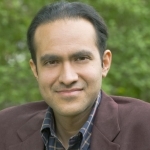 (HOST) Commentator and UVM Professor Saleem Ali has been thinking about the enduring legacy of Mother Teresa
(HOST) Commentator and UVM Professor Saleem Ali has been thinking about the enduring legacy of Mother Teresa
(ALI)
During a recent trip to the Balkans, leading a field course for Vermont
students, I had an opportunity to visit Albania, Mother Teresa’s land
of ethnic origin, as well as her birthplace in Skopje, Macedonia. Even
Muslim-majority Albania proudly celebrates this great soul who is now on
a fast-track with the Vatican to become a saint. The absolute altruism
which Mother Teresa displayed towards those most in need captivated
people of all Faiths and indeed people of no Faith. Mother Teresa has
become emblematic of the arguments used to suggest the salience of
religion as a positive force. The question implicit in conversations is:
can such selfless acts be possible without some transcendent
theological motivation?
While there are clearly examples of
non-believers engaging in many humanitarian acts, there is little doubt
that religious motivation has played a positive role in many charitable
acts worldwide. Indeed the most extreme examples of charity involving
self-denial, as well as extreme acts of violence, often emanate from
religious motivation. But regardless of what motivates such polarized
behaviors, it is important for us to pause and reflect on what we might
learn from the positive players in improving our own conduct.
Earlier
this month The Economist magazine compared Mother Teresa and Lady Gaga
as two women from whom corporate executives can learn much about
leadership that doesn’t require particular training but commitment –
albeit in totally different realms. Such incongruous comparisons are not
new. Recall that Mother Teresa passed during the same week that Lady
Diana died as well and commentators were quick to compare their relative
acts of philanthropy. Perhaps the most insightful comparison was
offered then by the late Daniel Schor, NPR’s venerable elder who passed
away recently. Mr. Schor stated then and I quote: "Let us not forget the
difference between a noble life well-lived and a life of nobility
well-cultivated."
As with all celebrities, Mother Teresa too had her
detractors. The proudly acerbic journalist Christopher Hitchens who made
a documentary about her titled it "Hell’s Angel". Her critics mainly
accused her of romanticizing poverty and not doing enough to actually
help with economic development. In response Mother Teresa often said " I
try to give to the poor people for love what the rich could get for
money."
A simple, noble and enduring vision which coupled with
continuing efforts at development could indeed make this a more livable
and equitable world.